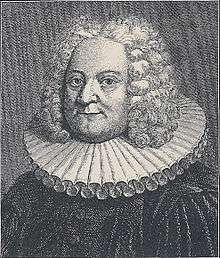Bartholomæus Deichman
Bartholomæus Deichman (9 August 1671 – 13 April 1731) was a Danish/Norwegian clergyman and Bishop. [1]
Right Reverend Doctor Bartholomæus Deichman | |
|---|---|
| Bishop | |
 | |
| Church | Church of Norway |
| Diocese | Christiania (1699-1712) |
| Predecessor | Hans Munch |
| Successor | Peder Hersleb |
| Personal details | |
| Born | 5 August 1671 Copenhagen, Denmark |
| Died | 13 April 1731 (aged 76) Christiania, Norway |
| Nationality | Danish-Norwegian |
| Denomination | Christian |
| Occupation | Priest |
Deichman was born in Copenhagen, Denmark. He was the son of Carl Deichman (ca. 1639-1684) and his wife Else Pedersdatter (d. ca. 1675). He took his Baccalaureate in 1688. After theological exam in 1690, he studied in Frankfurt, Leiden and Utrecht. He first served as a chaplain with the Danish military auxiliaries. In 1697, he had secured a clerical position in Copenhagen. He served as Bishop of Viborg from 1700, and Bishop of the Diocese of Oslo from 1713 to 1730. [2]
Personal life
In 1699, he married Else Rosemeyer (ca. 1669-1745), daughter of Carl Rosemeyer (d. 1670) and his wife Anna Pedersdatter (d. 1679). They had six children, three sons and three daughters. Their son Carl Deichman (1705–1780) was an investor in Fossum Ironworks and later owner of Eidsfos Verk.[3] Their daughter Margrethe Deichman (1708–1759) was married to Chancellor Herman Løvenskiold (1701-1759), a member of the noble Løvenskiold noble family who owned Borgestad Manor in Gjerpen.[4][5]
References
- Godal, Anne Marit (ed.). "Bartholomæus Deichman". Store norske leksikon (in Norwegian). Oslo: Norsk nettleksikon. Retrieved 8 June 2012.
- Supphellen, Steinar. "Bartholomæus Deichman". In Helle, Knut (ed.). Norsk biografisk leksikon (in Norwegian). Oslo: Kunnskapsforlaget. Retrieved 8 June 2012.
- Eidsfoss jernverk (lokalhistoriewiki.no)
- Øystein Rian. "Herman Løvenskiold, Jernverkseier, Godseier, Kanselliråd". Norsk biografisk leksikon. Archived from the original on 2016-08-16. Retrieved July 15, 2016.
- Jon Gunnar Arntzen. "Borgestad". Store norske leksikon. Retrieved July 15, 2016.
| Religious titles | ||
|---|---|---|
| Preceded by Hans Munch |
Bishop of Oslo 1713– 1730 |
Succeeded by Peder Hersleb |